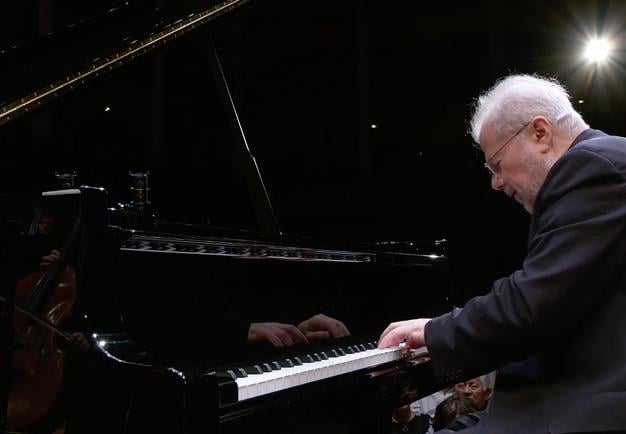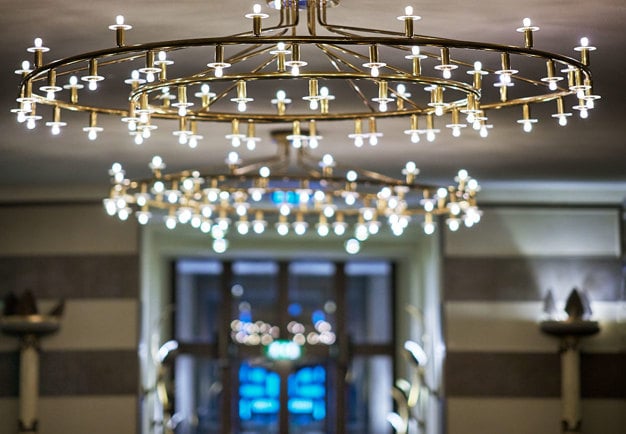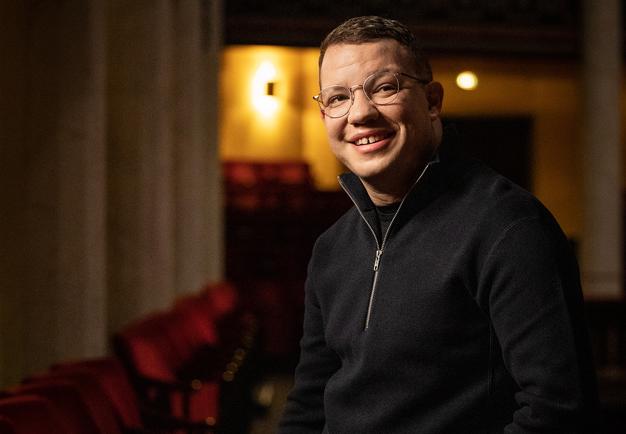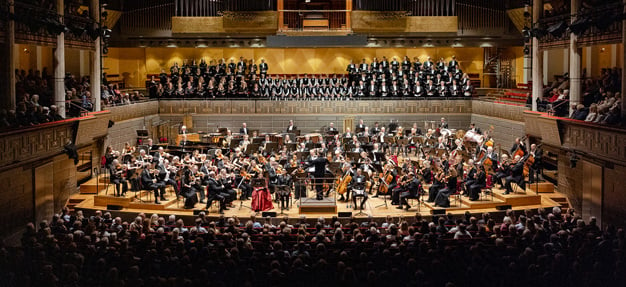

Royal Stockholm Philharmonic Orchestra
With over 100 concerts a year and creative programming, it’s an orchestra constantly evolving. The Royal Stockholm Philharmonic Orchestra has probably never been better.
The Royal Stockholm Philharmonic Orchestra is today among the most active streaming players worldwide. With its digital platform Konserthuset Play, the orchestra offers a comprehensive library of filmed performances which are available for free streaming anywhere in the world.
In the following sections, you can read more about the orchestra's history since 1902 – its historic chief conductors, guests and tours – and get acquainted with the members of the orchestra of today.
Concerts with the Royal Stockholm Philharmonic Orchestra
-
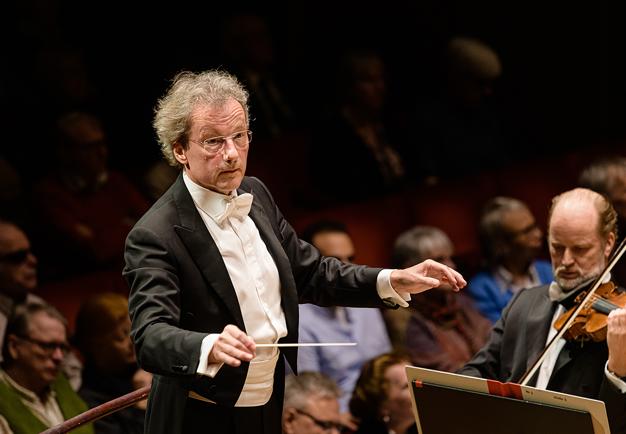 Genre: Royal Stockholm Philharmonic Orchestra
Genre: Royal Stockholm Philharmonic OrchestraFranz Welser-Möst in music by youthful Schubert and adventurous Strauss – with cowbells and wind machine.
Friday 25 April 2025 19.00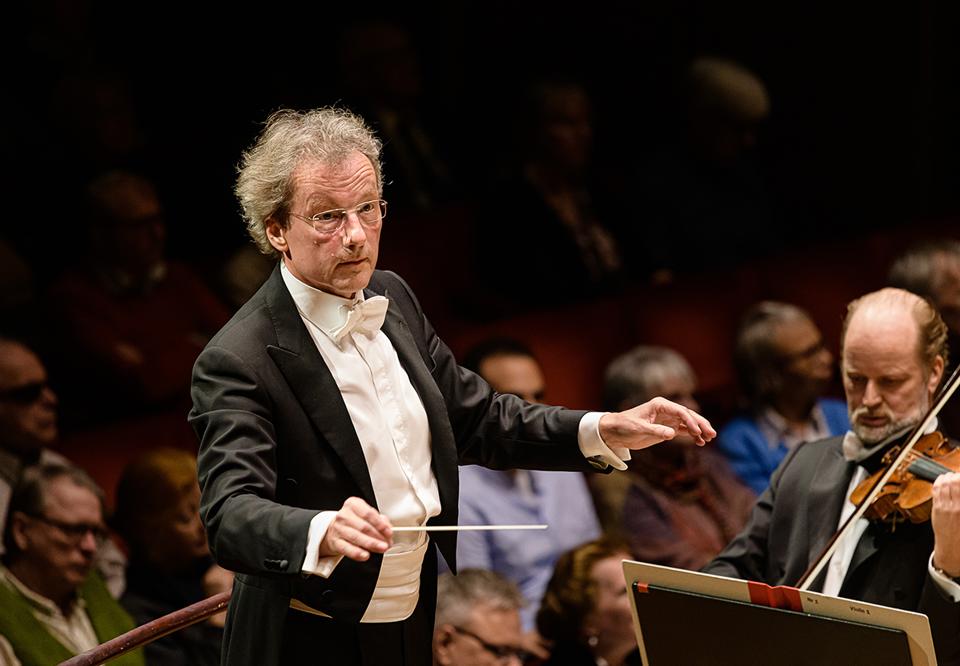
Foto: Jan-Olav Wedin
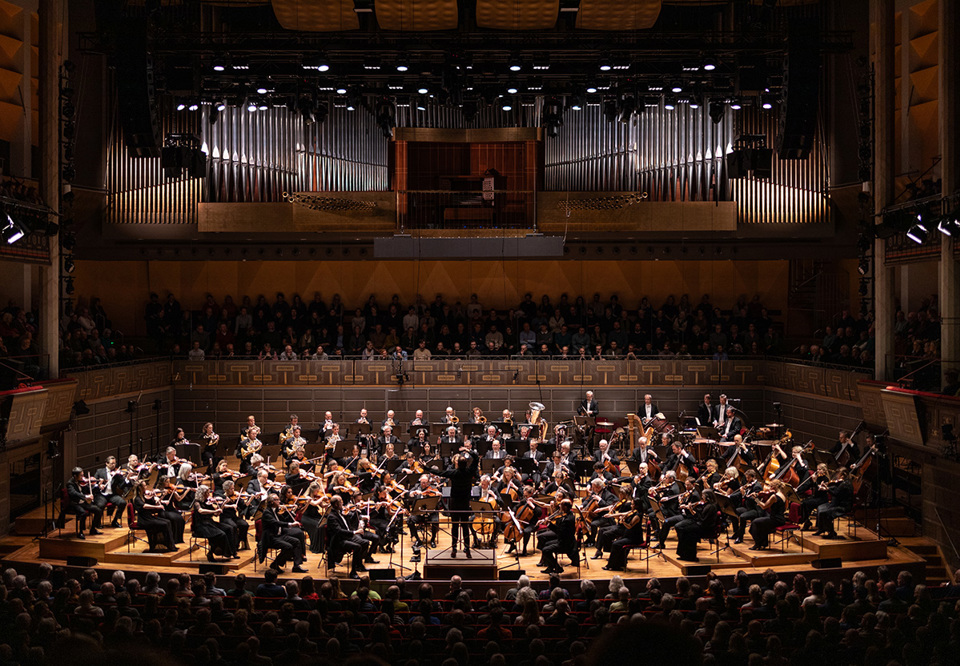
Royal Stockholm Philharmonic Orchestra. Photo: Nadja Sjöström
Genre: Royal Stockholm Philharmonic OrchestraAn Alpine Symphony
Franz Welser-Möst in music by youthful Schubert and adventurous Strauss – with cowbells and wind machine.
Friday 25 April 2025 19.00
Ends approximately 21.00Save in calendarThe event has been downloaded Open the file saved on your device to add it to your digital calendar.Price:
145-470 SEK50% discount for those 26 and under. 10% discount for students, pensioners and the unemployed. 15% discount for subscribers.The Main Hall currently has capacity for 1,770 people, spread across the stalls, first and second balconies and choir balcony. Each floor can be accessed by lift or the stairs. Due to the location of pillars, a number of seats have a fully or partially restricted view. These are indicated in the booking system. The hall has six wheelchair places.
The link has been copied https://www.konserthuset.se/en/programme/calendar/concert/2025/an-alpine-symphony/20250425-1900/The event has been downloaded Open the file saved on your device to add it to your digital calendar.Franz Schubert was only around 17–18 years old when he wrote his second symphony. Yet it is an impressive work in the spirit of Beethoven. In other words, it is music full of contrasts and captivating melodies.
The Royal Stockholm Philharmonic Orchestra is led by Franz Welser-Möst, who in 2018 was awarded the title Eric Ericson Honorary Chair. Since 2020, he regularly conducts the orchestra. It is a collaboration that follows the bond that developed between the orchestra and conductor during the initial concerts together, and has deepened over the years.
A composer who holds a special place in Welser-Möst's heart is Richard Strauss. Here, he leads the orchestra in An Alpine Symphony, which, despite the title, is not a traditional symphony but a tone poem that depicts a dramatic journey up and down an Alpine mountain, with changing weather and nature immersions. To portray the adventure, Strauss prescribes an enormous orchestra – including cowbells, wind and thunder machines, and an extra-large brass section.
-
The music
Approximate times -
Franz Schubert Symphony No. 228 min
-
Intermission25 min
-
Richard Strauss Eine Alpensinfonie52 min
-
Participants
- Royal Stockholm Philharmonic Orchestra
- Franz Welser-Möst conductor
Friday 25 April 2025 19.00
Ends approximately 21.00Save in calendarThe event has been downloaded Open the file saved on your device to add it to your digital calendar.Price:
145-470 SEK50% discount for those 26 and under. 10% discount for students, pensioners and the unemployed. 15% discount for subscribers.The Main Hall currently has capacity for 1,770 people, spread across the stalls, first and second balconies and choir balcony. Each floor can be accessed by lift or the stairs. Due to the location of pillars, a number of seats have a fully or partially restricted view. These are indicated in the booking system. The hall has six wheelchair places.
Other occasions
Ends approximately 17.00
Save in calendarThe event has been downloaded Open the file saved on your device to add it to your digital calendar.Price:
145-470 SEK50% discount for those 26 and under. 10% discount for students, pensioners and the unemployed. 15% discount for subscribers.The Main Hall currently has capacity for 1,770 people, spread across the stalls, first and second balconies and choir balcony. Each floor can be accessed by lift or the stairs. Due to the location of pillars, a number of seats have a fully or partially restricted view. These are indicated in the booking system. The hall has six wheelchair places.
-
-
 Genre: Royal Stockholm Philharmonic Orchestra
Genre: Royal Stockholm Philharmonic OrchestraFranz Welser-Möst in music by youthful Schubert and adventurous Strauss – with cowbells and wind machine.
Saturday 26 April 2025 15.00
Foto: Jan-Olav Wedin

Royal Stockholm Philharmonic Orchestra. Photo: Nadja Sjöström
Genre: Royal Stockholm Philharmonic OrchestraAn Alpine Symphony
Franz Welser-Möst in music by youthful Schubert and adventurous Strauss – with cowbells and wind machine.
Saturday 26 April 2025 15.00
Ends approximately 17.00Save in calendarThe event has been downloaded Open the file saved on your device to add it to your digital calendar.Price:
145-470 SEK50% discount for those 26 and under. 10% discount for students, pensioners and the unemployed. 15% discount for subscribers.The Main Hall currently has capacity for 1,770 people, spread across the stalls, first and second balconies and choir balcony. Each floor can be accessed by lift or the stairs. Due to the location of pillars, a number of seats have a fully or partially restricted view. These are indicated in the booking system. The hall has six wheelchair places.
The link has been copied https://www.konserthuset.se/en/programme/calendar/concert/2025/an-alpine-symphony/20250426-1500/The event has been downloaded Open the file saved on your device to add it to your digital calendar.Franz Schubert was only around 17–18 years old when he wrote his second symphony. Yet it is an impressive work in the spirit of Beethoven. In other words, it is music full of contrasts and captivating melodies.
The Royal Stockholm Philharmonic Orchestra is led by Franz Welser-Möst, who in 2018 was awarded the title Eric Ericson Honorary Chair. Since 2020, he regularly conducts the orchestra. It is a collaboration that follows the bond that developed between the orchestra and conductor during the initial concerts together, and has deepened over the years.
A composer who holds a special place in Welser-Möst's heart is Richard Strauss. Here, he leads the orchestra in An Alpine Symphony, which, despite the title, is not a traditional symphony but a tone poem that depicts a dramatic journey up and down an Alpine mountain, with changing weather and nature immersions. To portray the adventure, Strauss prescribes an enormous orchestra – including cowbells, wind and thunder machines, and an extra-large brass section.
-
The music
Approximate times -
Franz Schubert Symphony No. 228 min
-
Intermission25 min
-
Richard Strauss Eine Alpensinfonie52 min
-
Participants
- Royal Stockholm Philharmonic Orchestra
- Franz Welser-Möst conductor
Saturday 26 April 2025 15.00
Ends approximately 17.00Save in calendarThe event has been downloaded Open the file saved on your device to add it to your digital calendar.Price:
145-470 SEK50% discount for those 26 and under. 10% discount for students, pensioners and the unemployed. 15% discount for subscribers.The Main Hall currently has capacity for 1,770 people, spread across the stalls, first and second balconies and choir balcony. Each floor can be accessed by lift or the stairs. Due to the location of pillars, a number of seats have a fully or partially restricted view. These are indicated in the booking system. The hall has six wheelchair places.
Other occasions
Ends approximately 21.00
Save in calendarThe event has been downloaded Open the file saved on your device to add it to your digital calendar.Price:
145-470 SEK50% discount for those 26 and under. 10% discount for students, pensioners and the unemployed. 15% discount for subscribers.The Main Hall currently has capacity for 1,770 people, spread across the stalls, first and second balconies and choir balcony. Each floor can be accessed by lift or the stairs. Due to the location of pillars, a number of seats have a fully or partially restricted view. These are indicated in the booking system. The hall has six wheelchair places.
-
-
 Genre: Royal Stockholm Philharmonic Orchestra
Genre: Royal Stockholm Philharmonic OrchestraChief Conductor Ryan Bancroft conducts music that triumphs over darkness.
Wednesday 7 May 2025 18.00
Chief Conductor Ryan Bancroft. Photo: Yanan Li

Royal Stockholm Philharmonic Orchestra. Photo: Nadja Sjöström
Genre: Royal Stockholm Philharmonic OrchestraSchumann's second symphony
Chief Conductor Ryan Bancroft conducts music that triumphs over darkness.
Wednesday 7 May 2025 18.00
Ends approximately 19.10Save in calendarThe event has been downloaded Open the file saved on your device to add it to your digital calendar.Price:
130-385 SEK50% discount for those 26 and under. 10% discount for students, pensioners and the unemployed. 15% discount for subscribers.The Main Hall currently has capacity for 1,770 people, spread across the stalls, first and second balconies and choir balcony. Each floor can be accessed by lift or the stairs. Due to the location of pillars, a number of seats have a fully or partially restricted view. These are indicated in the booking system. The hall has six wheelchair places.
The link has been copied https://www.konserthuset.se/en/programme/calendar/concert/2025/schumanns-second-symphony/20250507-1800/The event has been downloaded Open the file saved on your device to add it to your digital calendar.Full of inspiration, Robert Schumann began work on his second symphony in early December 1845. However, his depressions, poor health, and constant tinnitus meant that it wasn't until the following autumn that the symphony was completed. Yet, his severe personal condition has not left its mark on the music at all; instead, the symphony is bright and forward-looking, a resounding triumph over the darker aspects of life.
The concert begins with the Finnish composer Kaija Saariaho's hypnotically evocative Ciel d’hiver, Winter Sky – an arrangement of a part of her orchestral work Orion. The music is inspired by the Greek myth of the hunter Orion, who was transformed into a constellation. Saariaho's music possesses a strange beauty that makes her unique, and she is considered one of the most significant composers of our time. Saariaho passed away in 2023, and ten years earlier, she was awarded the Polar Music Prize.
-
The music
Approximate times -
Kaija Saariaho Ciel d’hiver10 min
-
Robert Schumann Symphony No. 237 min
-
Participants
- Royal Stockholm Philharmonic Orchestra
- Ryan Bancroft conductor
Wednesday 7 May 2025 18.00
Ends approximately 19.10Save in calendarThe event has been downloaded Open the file saved on your device to add it to your digital calendar.Price:
130-385 SEK50% discount for those 26 and under. 10% discount for students, pensioners and the unemployed. 15% discount for subscribers.The Main Hall currently has capacity for 1,770 people, spread across the stalls, first and second balconies and choir balcony. Each floor can be accessed by lift or the stairs. Due to the location of pillars, a number of seats have a fully or partially restricted view. These are indicated in the booking system. The hall has six wheelchair places.
-
-

